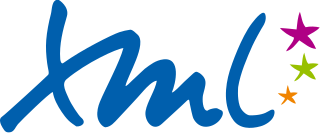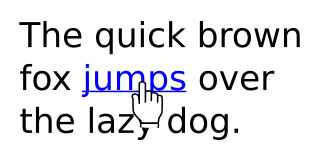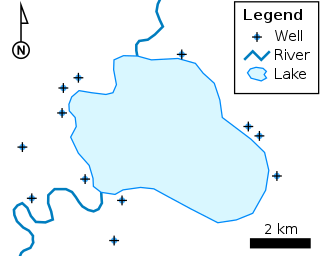XLink (XML Linking Language) is an XML markup language.
Xlink or Xlinks may also refer to:
- XLINK (Internet service provider), an early German networking company
- Xlinks Morocco–UK Power Project or Xlinks, a proposed electricity project
XLink (XML Linking Language) is an XML markup language.
Xlink or Xlinks may also refer to:
Scalable Vector Graphics (SVG) is an XML-based vector image format for defining two-dimensional graphics, having support for interactivity and animation. The SVG specification is an open standard developed by the World Wide Web Consortium since 1999.

The Standard Generalized Markup Language is a standard for defining generalized markup languages for documents. ISO 8879 Annex A.1 states that generalized markup is "based on two postulates":

Extensible Markup Language (XML) is a markup language and file format for storing, transmitting, and reconstructing arbitrary data. It defines a set of rules for encoding documents in a format that is both human-readable and machine-readable. The World Wide Web Consortium's XML 1.0 Specification of 1998 and several other related specifications—all of them free open standards—define XML.

In computing, a hyperlink, or simply a link, is a digital reference to data that the user can follow or be guided to by clicking or tapping. A hyperlink points to a whole document or to a specific element within a document. Hypertext is text with hyperlinks. The text that is linked from is known as anchor text. A software system that is used for viewing and creating hypertext is a hypertext system, and to create a hyperlink is to hyperlink. A user following hyperlinks is said to navigate or browse the hypertext.

Shareaza is a peer-to-peer file sharing client running under Microsoft Windows which supports the Gnutella, Gnutella2 (G2), eDonkey, BitTorrent, FTP, HTTP and HTTPS network protocols and handles magnet links, ed2k links, and the now deprecated gnutella and Piolet links. It is available in 30 languages.

The Geography Markup Language (GML) is the XML grammar defined by the Open Geospatial Consortium (OGC) to express geographical features. GML serves as a modeling language for geographic systems as well as an open interchange format for geographic transactions on the Internet. Key to GML's utility is its ability to integrate all forms of geographic information, including not only conventional "vector" or discrete objects, but coverages and sensor data.
In computing, Resource Directory Description Language (RDDL) is an extension of XHTML Basic 1.0. An RDDL document, called a Resource Directory, provides a package of information about some target. The targets which RDDL was designed to describe are XML namespaces. The specification for RDDL has no official standing and has not been considered nor approved by any organization.
XML Linking Language, or XLink, is an XML markup language and W3C specification that provides methods for creating internal and external links within XML documents, and associating metadata with those links.

XBRL is a freely available and global framework for exchanging business information. XBRL allows the expression of semantics commonly required in business reporting. The standard was originally based on XML, but now additionally supports reports in JSON and CSV formats, as well as the original XML-based syntax. XBRL is also increasingly used in its Inline XBRL variant, which embeds XBRL tags into an HTML document. One common use of XBRL is the exchange of financial information, such as in a company's annual financial report. The XBRL standard is developed and published by XBRL International, Inc. (XII).
Plain Old XML (POX) is the basic XML, sometimes mixed in with other, blendable specifications like XML Namespaces, Dublin Core, XInclude and XLink. This contrasts with complicated, multilayered XML specifications like those for web services or RDF. The term may have been derived from or inspired by the expression plain old telephone service (POTS) and, similarly Plain Old Java Object (POJO).

XLink Kai is a program developed by Team XLink allowing for online play of video games with support for LAN multiplayer modes. It enables players on the GameCube, Nintendo Switch, PlayStation 2, PlayStation 3, PlayStation 4, PlayStation Portable, PlayStation Vita / PlayStation TV, Xbox, Xbox 360, and Xbox One to play games across the Internet using a network configuration that simulates a local area network (LAN). It notably also allows original Xbox games to be played online again following the Xbox Live shutdown on 21 April 2010 and certain GameSpy titles such as Saints Row 2 to be played online after the GameSpy network shutdown on 31 May 2014.
The Open Settlement Protocol (OSP) is a client/server protocol used by Internet service providers to exchange authorization, accounting, and usage information to support IP telephony. Open Settlement Protocol is implemented in voice telephony gateways such as softswitches, H.323 multimedia conferencing gateways, and Session Initiation Protocol (SIP) proxies.
Catalogue Service for the Web (CSW), sometimes seen as Catalogue Service - Web, is a standard for exposing a catalogue of geospatial records in XML on the Internet. The catalogue is made up of records that describe geospatial data, geospatial services, and related resources.
DDL is part of the MPEG-7 standard. It gives an important set of tools for the users to create their own Description Schemes (DSs) and Descriptors (Ds). DDL defines the syntax rules to define, combine, extend and modify Description Schemes and Descriptors.
Extensible HyperText Markup Language (XHTML) is part of the family of XML markup languages which mirrors or extends versions of the widely used HyperText Markup Language (HTML), the language in which Web pages are formulated.
XPath is an expression language designed to support the query or transformation of XML documents. It was defined by the World Wide Web Consortium (W3C) in 1999, and can be used to compute values from the content of an XML document. Support for XPath exists in applications that support XML, such as web browsers, and many programming languages.
Animation of Scalable Vector Graphics, an open XML-based standard vector graphics format is possible through various means:
Steven J DeRose is a computer scientist noted for his contributions to computational linguistics and to key standards related to document processing, mostly around ISO's Standard Generalized Markup Language (SGML) and W3C's Extensible Markup Language (XML).
XLL is the XML Linking Language, or XLink, an XML markup language.